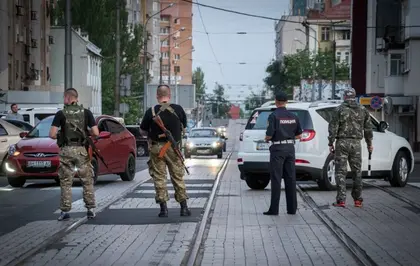“We don’t call on anyone to do this, we don’t encourage it. But realistically, to stop them would be impossible,” Nikolai Patrushev, secretary of Russia’s Security Council, said in an interview with the country’s state-run RIA Novosti news agency on June 22.
At least one Russian volunteer who fought alongside the separatists in eastern Ukraine disagrees.
Bondo Dorovskikh, a Russian citizen who returned to Moscow in April after fighting alongside Luhansk separatists, called Patrushev’s comments “bullshit.”
“When you go across the border they don’t even try to stop you. Even if you are carrying a radio and ammunition. They have no desire to stop the volunteers. If they did, no one would get through,” Dorovskikh told the Kyiv Post.
“The first step Russia should take to achieve peace is to stop these Russian volunteers and ‘tourists.’ As soon as they do that, then they can honestly say they want peace in Donbas,” he said.
Dorovskikh spent about four months fighting in Luhansk because he said he honestly believed he was protecting civilians from fascists.
But he quickly become disillusioned.
“It’s not like they show on TV there. The main thing is that the local population really does not support the separatists, with rare exceptions, including the families of the separatists,” he said.
“It’s more important to fight on the other side, because they have a reason to be fighting, they are fighting to save the integrity of their nation,” he said.
Dorovskikh said he had not been questioned by law enforcement authorities immediately upon his return to Russia – but he was called in after speaking to journalists and criticizing the Russian separatists.
“I expect that somewhere within the next month something will come of this, they will start to dig up all my old sins,” he said. He said he believed the only reason any action had been taken against him was because he’d spoken out against separatist forces.
Russia has a law on mercenaries on the books – but so far it has only used the statute against citizens who fought for Kyiv, like Roman Zheleznov, a Russian citizen who late last year was charged for fighting in the pro-Kyiv Azov Battalion.
The Investigative Committee used the statute on “mercenaries” against Zheleznov, but no such cases have been opened against any Russian men who fought alongside the separatists.
Even high-profile former separatist leaders like Alexander Borodai and Igor Strelkov – both Russian citizens – are allowed to continue their lives as if nothing happened.
Russia could easily follow the example of Germany, Poland, Spain and even Belarus and prosecute its citizens for fighting alongside separatists in eastern Ukraine, but it does nothing of the sort.
“It’s de-facto government policy to support those going there to fight,” said Dorovskikh, adding that “there is literally no one to prosecute these volunteers.”
Alexander Grigorenko, a Russian citizen who had been fighting with the rebels since last summer, returned to Perm on June 24.
“I have not been questioned by anybody, and I’m not worried about any charges against me,” Grigorenko, a member of the Youth Parliament in the Perm region’s Legislative Assembly, told the Kyiv Post.
“As far as I know, they don’t charge anyone for joining the separatists,” he said, adding that there had been at least a dozen other Russian ‘volunteers’ in his unit when he first joined.
Even the wording of Russia’s legislation on mercenaries makes the state’s bias clear: A mercenary is defined as someone who “takes part [in fighting] in a foreign state alongside armed groups not recognized as legal by the given state’s legislation, with aims counter to the interests of the Russian Federation.”
Since the separatist fighters’ aims do not run “counter to the interests of the Russian Federation,” they are immune to the law.
Yes, it is in Russia’s interests that these men wreak havoc next door – or at least, that is what authorities are implying by not punishing them.
Dorovskikh said he was angry – at the Russian government, at the media’s propaganda. He said the volunteers had been tricked into being used as cannon fodder in a wider political game.
“You’re standing in the trenches, people are literally dying right before your eyes, and these scumbags, these corrupt people are sitting in an office somewhere warming their hands,” he said.
Staff writer Allison Quinn can be reached at [email protected]
You can also highlight the text and press Ctrl + Enter




